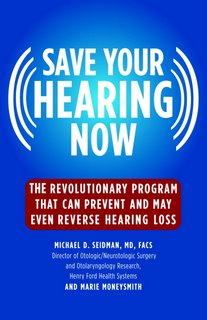Stick it in Your Ear (Earplugs, That Is)!
 ‘Tis the season to attend indoor sporting events, but if you’re headed in that direction you might want to take some hearing protection along. A new study published in the Canadian Medical Association Journal this month reported that noise levels at hockey games were off the charts, topping 120 dB when the home team scored. In fact, researchers said the noise – most of it from enthusiastic fans -- was comparable to what’s produced by a chainsaw or a jet engine.
‘Tis the season to attend indoor sporting events, but if you’re headed in that direction you might want to take some hearing protection along. A new study published in the Canadian Medical Association Journal this month reported that noise levels at hockey games were off the charts, topping 120 dB when the home team scored. In fact, researchers said the noise – most of it from enthusiastic fans -- was comparable to what’s produced by a chainsaw or a jet engine.During an eight-hour span, an 85 dB average is typically the maximum daily dose of noise. Keep in mind, though, that the possibility of hearing damage increases dramatically with even what appears to be a small jump in the decibel scale. In other words, a mere three dB increase in average noise level – from 85 dB to 88 dB -- slashes safe exposure time by 50 percent, to only four hours. Factor in another 3 dBs (91 dB average), and two hours is the limit. Unfortunately, researchers calculated that hockey fans maxed out their daily noise allotment in just six minutes!
Don’t sell those season tickets just yet, though. Inexpensive foam earplugs could cut noise exposure by 25 to 30 dB, say researchers, reducing the average sound exposure during the games to under 80 dB, and thereby protecting against hearing damage.
Temporary hearing loss and/or ringing in the ears is a common consequence of attending indoor sports events and music concerts, and generally normal hearing returns in a day or so. But repeated assaults on the ears can turn temporary damage into permanent hearing loss, so don’t forget those earplugs (they make excellent stocking stuffers, too!).
Labels: earplugs, hearing loss, hockey


